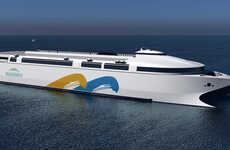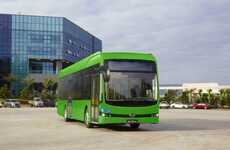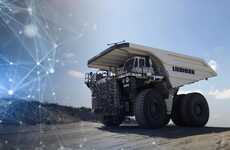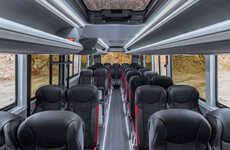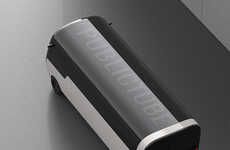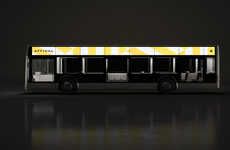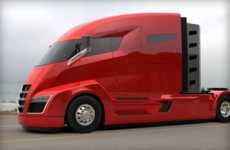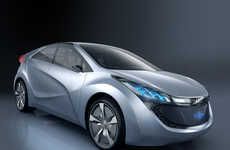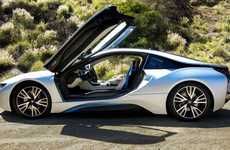
The Lancaster eBus is the World's Largest Battery Electric Vehicle
Rahul Kalvapalle — October 21, 2014 — Autos
The Lancaster eBus is a massive articulated electric bus that is claimed by its developer BYD Motors to be the world's largest battery electric vehicle. It was introduced to the world at the American Public Transporation Association Expo in Houston. The bus is named after the city of Lancaster in California, which is where it was designed and built over a period of two years.
The 18.2-meter bus looks like any other accordion bus, but its appearance belies the highly advanced electric drive technology that it contains. It is equipped with in-wheel motors that can handle gradients of up to 21%, making it perfect for hilly urban areas. They provide a range of over 288 km with a load of 120 passengers.
This electric bus' battery can be recharged 10,000 times while still retaining a 70% charge, giving it an impressive 25-year lifespan.
The 18.2-meter bus looks like any other accordion bus, but its appearance belies the highly advanced electric drive technology that it contains. It is equipped with in-wheel motors that can handle gradients of up to 21%, making it perfect for hilly urban areas. They provide a range of over 288 km with a load of 120 passengers.
This electric bus' battery can be recharged 10,000 times while still retaining a 70% charge, giving it an impressive 25-year lifespan.
Trend Themes
1. Massive Battery Electric Vehicles - Developing even larger battery electric vehicles with diverse applications like cargo transport could disrupt the logistics industry.
2. In-wheel Motor Technology for Buses - Developing in-wheel motor technology for other buses and commercial vehicles could disrupt the transportation industry by providing reliable, efficient, and sustainable transport.
3. Long-lasting Battery Technologies - Developing long-lasting batteries for various industries like renewable energy, aerospace, and medical devices could disrupt the status quo and provide ample growth opportunities.
Industry Implications
1. Public Transportation - The Lancaster eBus is just the beginning, and many small and large public transport companies could disrupt the industry by adopting similar battery electric vehicles.
2. Logistics - Developing cargo electric vehicles with larger battery capacity could be the key to successful and sustainable logistics that disrupt the shipping and freight industry.
3. Automotive - Developing reliable, long-lasting, and efficient batteries for electric cars, buses, and trucks could disrupt the automotive industry as electric vehicles continue to gain popularity.
4.1
Score
Popularity
Activity
Freshness


